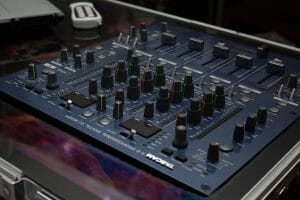DJ Mixers and How They Work
Being a DJ is not always fun, as it often requires an acute understanding of the devices you are controlling and their functionality. To produce impressive mixes and make smooth transitions between tracks, you have to be familiar with the entire set-up you are using. The DJ mixer is the device which helps mostly in regulating the sound and changing tracks. It controls the essential sound parameters. It allows keeping the volume balanced and equalizes the sounds to suit the ambiance. All of this is done with the help of knobs and faders that can regulate up to eight channels. Each channel controls the output effect of an amplifier or speaker. With the mixer, it is easy to fade the sounds for making efficient transitions and regulate diverse sound elements which would enhance the atmosphere in your environment.
 The DJ mixer differs from other audio mixers. The main difference lies in DJ mixer’s ability to transmit a source apart from the active set playing in the headphones. This helps the DJ to trigger a cue point – where the recording for his mix will start. With the cross-fader featured on DJ mixers, the DJ can start slowly transcending into the next mix. Other features, which have been popularized in recent years, are the effect knobs and the reverb. It is possible to connect microphones to DJ mixers, which became very useful for introducing the voice in the tracks or short spoken presentations at the beginning of performances. The DJ mixer allows to switch off frequency bands with the control switch and cut off the low, mid and high ends with the kill switch. You have the possibility connect more devices due to their RCA inputs. They have ground posts, which help in grounding the electric current. With this, any damage that can be done to the DJs from the mixer’s flowing electricity is prevented, and it ensures that the sound remains clean, which otherwise can be disturbed by the current.
The DJ mixer differs from other audio mixers. The main difference lies in DJ mixer’s ability to transmit a source apart from the active set playing in the headphones. This helps the DJ to trigger a cue point – where the recording for his mix will start. With the cross-fader featured on DJ mixers, the DJ can start slowly transcending into the next mix. Other features, which have been popularized in recent years, are the effect knobs and the reverb. It is possible to connect microphones to DJ mixers, which became very useful for introducing the voice in the tracks or short spoken presentations at the beginning of performances. The DJ mixer allows to switch off frequency bands with the control switch and cut off the low, mid and high ends with the kill switch. You have the possibility connect more devices due to their RCA inputs. They have ground posts, which help in grounding the electric current. With this, any damage that can be done to the DJs from the mixer’s flowing electricity is prevented, and it ensures that the sound remains clean, which otherwise can be disturbed by the current.
It is possible to connect the balanced outputs straight to the amplifier. You can connect to a DJ mixer such devices as, speakers, power amplifiers, subwoofers and other sound equipment. The DJ mixer is very practicable at events because it is enough to connect it to the main audio console and start broadcasting on radio, which will output clean sound, like on professional recordings.
The modern DJ mixers are designed to be compatible with most of the programs used by DJs. Despite that, there are many who rather prefer to control everything in the DJ software. However, using mixers is a standard approach, and every DJ should be familiar with it. The mixers nowadays meet any musician’s standards ensuring that every user can perceive and be entertained by their functions.
There are many DJ mixers on the market, and they may differ in their parameters. However, most of the mixers will maintain the same basic structure and controls. We constantly experience inventions from different manufacturers, who tend to improve their devices. Nevertheless, DJ mixers will always be designed for the same purposes – regulating the volume, equalizing the effects and cross-fading.
